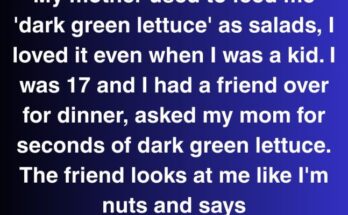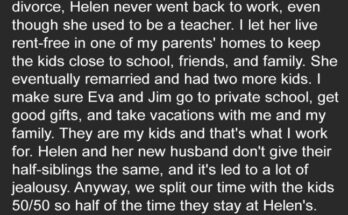fter my friend left, I asked my mom about it. She gave me this little smile and said, “It’s spinach, honey. Just sounded nicer when you were little. You always ate it when I called it lettuce.”
And just like that, a piece of my childhood snapped into focus. My mom—Anissa—had always been this gentle magician, finding ways to make life a little easier, a little softer. Even when things got hard, and they did get hard.
See, we didn’t have much growing up. My dad left when I was ten, disappeared into the fog of a “business trip” and never came back. Mom never bad-mouthed him, but she also didn’t pretend he’d return. She went from part-time baker at a hotel to working three jobs within months. The dark circles under her eyes became a permanent feature.
But she always made dinner. Every night. Even if it was rice and canned beans with a few shreds of cheese on top, she’d plate it with care and make us laugh around the table. There was no complaining allowed, except about how fast the food disappeared.
I didn’t realize until much later how much she sacrificed to make things feel normal.
After the spinach incident, I got curious. I asked her about other meals from my childhood. Like the “chicken nuggets” that were mysteriously shaped like odd little blobs. Or the “fruit drink” that came in unmarked bottles. She laughed and told me, “You liked what I could afford. That’s what mattered.”
Fast forward five years. I’m 22, fresh out of a community college program for graphic design, working contract gigs that barely pay rent. Mom’s still at that hotel bakery. She’s been promoted to head baker, but it doesn’t come with much more money—just more hours.
That winter, she slipped on ice outside the bakery. Broke her wrist and bruised a rib. And here’s the kicker—she didn’t even tell me right away. I only found out because her co-worker, Aida, texted me a picture of Mom with her arm in a sling.
I drove straight over, heart in my throat. She was sitting at th

